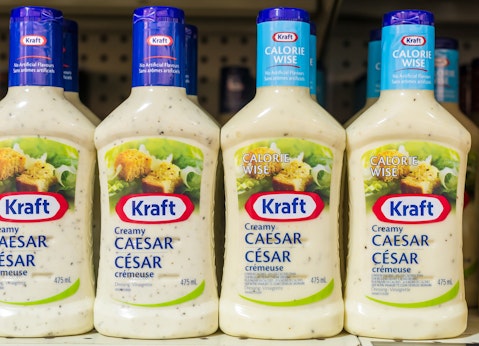The Kraft Heinz Company (NASDAQ:KHC) Q2 2023 Earnings Call Transcript August 2, 2023
The Kraft Heinz Company misses on earnings expectations. Reported EPS is $0.7 EPS, expectations were $0.74.
Operator: Good day and thank you for standing by. Welcome to the Kraft Heinz Company Second Quarter Results. At this time all participants are in a listen-only mode. [Operator Instructions]. Please be advised that today’s conference is being recorded. I would now like to hand the conference over to your speaker today, Anne-Marie Megela, Head of Global Investor Relations.
Anne-Marie Megela: Thank you and hello everyone! Welcome to our Q&A Session for our second quarter 2023 business update. During today’s call we may make forward-looking statements regarding our expectations for the future, including items related to our business, plans and expectations, strategy, efforts and investments, and related timing and expected impacts. These statements are based on how we see things today and actual results may differ materially due to risk and uncertainties. Please see the cautionary statement and risk factors contained in today’s earnings release, which accompanies this call, as well as our most recent 10-K, 10-Q, and 8-K filings for more information regarding these risks and uncertainties. Additionally, we may refer to non-GAAP financial measures, which exclude certain items from our financial results reported in accordance with GAAP.

rmnoa357 / Shutterstock.com
Please refer to today’s earnings release and the non-GAAP information available on our website at ir.kraftheinzcompany.com, under News & Events, for a discussion of our non-GAAP financial measures and reconciliations to the comparable GAAP financial measures. Before we begin, I’m going to hand it over to our CEO, Miguel Patricio for some brief opening comments.
Miguel Patricio: Well thank you Anne-Marie and thank you everyone. Thanks for joining us today. Before opening the call for questions, I would like to thank the entire Kraft Heinz team. We have proven again that our strategy works, generating top-line growth fueled by the three pillars, while reinvesting margin gains into the business. But while we did lose share in the quarter, as price gaps have stayed wider for longer than we would have liked, we are managing the business for the long term and still generated mid-single-digit top-line growth within the range of what we expected. As you may remember on the last earnings call, we introduced four action plans to drive share. We have seen those plans take hold, and they have led to improving results each month within the quarter, building momentum into the second half of the year.
The continued execution of these action plans and the lapping of last year’s pricing are expected to drive improving volume trends in the second half of 2023 and into 2024. Our results give me continued confidence in our strategy and in our business, and I’m pleased to reiterate our full year guidance. With that, I have Andre and Carlos joining me. Rafael [ph] is on a well-deserved vacation with his family, so let’s open the call for Q&A.
See also 25 Easiest Countries to Find a Wife and 20 Easiest Countries for White Guys to Get Laid.
Q&A Session
Follow Kraft Heinz Co (NASDAQ:KHC)
Follow Kraft Heinz Co (NASDAQ:KHC)
Receive real-time insider trading and news alerts
Operator: Thank you. [Operator Instructions]. Our first question comes from Andrew Lazar with Barclays. You may proceed.
Andrew Lazar : Great. Thanks so much. Good morning, everybody.
Andre Maciel: Good morning.
Miguel Patricio: Good morning, Andrew.
Andrew Lazar : I was hoping to dig into the promotional environment a little bit and some of the comments from your prepared remarks about branded competitors promoting at a higher level than Kraft Heinz. In your view, are branded competitors either over promoting or promoting in what you see as sort of in a irrational way, or is it more that KHC has not been able to ramp up its own merchandising activity yet to the extent needed, given some of those supply constraints and leading over the pricing actions? I guess in other words, would you still expect the industry promotional levels to settle in below 19 levels or is there some concern building internally that competitive behavior could return to previous levels or beyond, and that pricing could actually go negative at some point? I’m just trying to put some context around all of this. Thanks so much.
Miguel Patricio: Good morning, Andrew. Thanks for the question. I will ask Carlos to answer, since I believe it’s related to the U.S. retail.
Carlos Abrams-Rivera : Good morning, Andrew. You know the way that kind of I look at it is that if you look at the industry as a whole, today’s promotional levels are as you said, still below 2019. What we are seeing is that our branded competitors are actually closer to those levels, and what we are working on is how do we continue to make sure that we act with a thought of protecting our margins and building the virtuous cycle as we continue to improve on our marketing, continue to improve our services, our innovation, and importantly that we stay focused on driving the revenue management needed in order for us to be rational in terms of the effectiveness of our promotions. So if you look at our promotions this year, we actually have been very effective and efficient.
We actually are generating attractive ROIs in investments. I think the numbers right now are up 50 points versus 2019, and that’s true because the focus that we have on those agile AI Driven Revenue Management Tools, that we are applying to making sure that every promotion does have that kind of true ROI return. Now, on top of that, we’re also making sure that we are working to maximize the opportunity on those promotions, so the quality of our merchandising, especially when you look at displays continue to improve, and in fact our share of displays continue to see increasingly improvements over the first quarter. So I think all together what I would say is, our focus continues to be very much leveraging our revenue management tool, continue to focus and drive in the investments in terms of marketing innovation, which you will know will make sure that improve our view as we go into the second half of the year and on to 2024.
Andrew Lazar : Great. I’ll pass it on. Thank you.
Miguel Patricio: Thank you, Andrew.
Operator: Thank you. One moment for questions. Our next question comes from Ken Goldman with J.P. Morgan. You may proceed.
Ken Goldman : Hi, thanks. You mentioned that the second half’s organic sales growth rate will be more in line with the long-term algo, not to put too fine a point on it, just so we can model more accurately. I was just curious, does this mean you expect it to be within that 2% to 3% range, that’s your long-term algo or just getting somewhat closer to it?
Miguel Patricio: Thank you, Ken. Andre please?
Andre Maciel: Hi Ken. Good morning. As we have said in previous remarks, we expect to gradually go towards the long-term model. It might happen that we’re going to reach there between Q3 and Q4, but you should expect like revenue to be gravitating towards that, yes.
Ken Goldman : Okay, I’ll follow-up on that. And then I wanted to ask a follow-up about capital allocation priorities. Paying down debt is I think number three on that list, ahead of portfolio management. You highlighted that leverage is I guess more or less at your target. Does debt pay down thus move down a notch in importance, and I guess what I’m getting at is, is there a scenario in which you might, maybe start to buy back some stock again?
Andre Maciel: Yes. Yes, we are not changing our capital allocation policy now. So as we said, our priority has been to fund the business organically and I think we have been doing that very consistently. We – for us to maintain the dividends that we have, which provided a very attractive yield is critical and I think we feel good about our rating now, the level of the grade we had in the past 16 months. M&A, as we said before continues to be something that we actively look at. We’d like to – as we said in the remarks, we mentioned that multiple times, so we have been very disciplined in how we’re doing that. But there is no change at this point. I mean we’re always taking into consideration market dynamics and our capital structure, but we don’t have anything new to say at this point.





